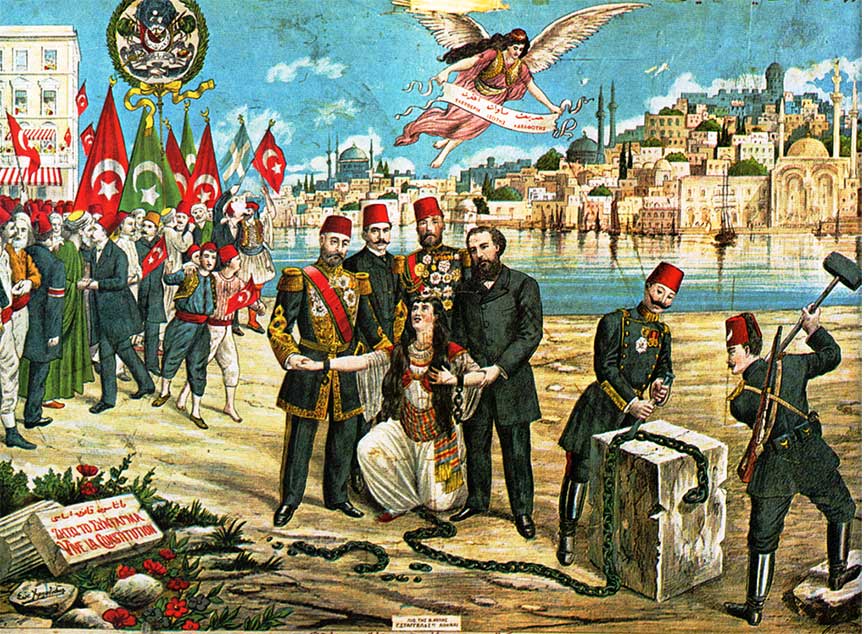Young Turks Revolt

A lithograph celebrating the Young Turk Revolution, featuring the sources of inspiration of the movement, Midhat Pasha, Prince Sabahaddin, Fuad Pasha and Namık Kemal, military leaders Niyazi Bey and Enver Pasha
The Turkish Sultan Abdul-Hamid II was forced to accede to the demands of the Young Turks, a group of army officers who demanded that constitutional rule be restored in Turkey.
In 1906 the Committee of Union and Progress was established in Salonika. The Committee was made up of Turkish reformers and young army officers.
In 1908 they went public with a cry that the only way to save the teetering Ottoman was fundamental constitutional reform in Turkey.
The continued chaos that was engulfing the Ottoman province of Macedonia was one of the catalysts for the Committee's call. There various ethnic factions were fighting, burning each other's villages and murdering civilians. The Great Powers were threatening to intervene, which would effectively end the Ottoman rule of Macedonia.
The Committee's call was supported by the Albanians, who, on the one hand, had traditionally supplied many troops to the Ottoman army. The Albanian, however, had many grievances against the government. Those included that their schools were closed, and they were not allowed to operate printing presses.
On July 3, 1908, Ahmed Niyazi Bey led a revolt in the Macedonian town of Resne. He seized the arms of a local garrison and headed to the hills with 200 soldiers and 200 civilians. He issues a manifesto stating he would combat the injustices that the country had been suffering. Soldiers soon joined bey, and officers from nearby Turkish garrisons joined.
On July 6, a member of the Ottoman Commission of Inquiry was assassinated in Salonika. The Sultan ordered one of his key generals Shemi Pasha to go to Macedonia and crush the rebellion. The day he arrived, he, too, was assassinated on July 7. The Sulta then send Marshal Osman Pasha, but his troops refused to fire on fellow soldiers
On July 20, the population of Monastir revolted and seized all of the military supplies in the city. The revolt soon spread to other towns. One by one, the Young Turks were gaining control of towns and provinces, declaring that the Turkish Constitution of 1876 had been restored. By the end of July, the young Turks had the support of a significant portion of the army. Two army corps that were based in Salonika threatened to march on Constantinople if the constitution was not restored.
Sultan Abdul Hamid realized that he had no choice, and on July 24, 1908, he agreed to the restoration of the Constitution of 1876.
He further agreed to abolish censorship and release all political prisoners. A new Grand Vizier Kamil Pasha was appointed, who promised to modernize the Ottoman Empire.
The decision was greeted with joy throughout the empire, with various populations pledging their support for the constitution.
 >
>